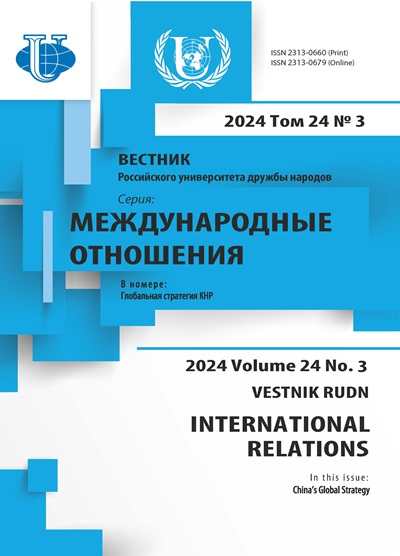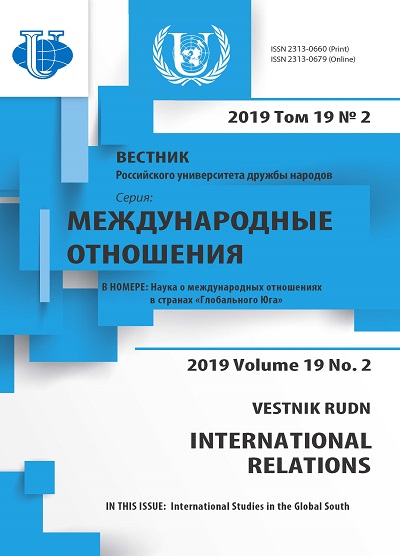Foreign Policy Thinking in Latin America: Concepts, Approaches and Research Directions
- Authors: Prokhorenko I.L.1
-
Affiliations:
- National Research Institute of World Economy and International Relations, Russian Academy of Sciences
- Issue: Vol 19, No 2 (2019): International Studies in the Global South
- Pages: 177-186
- Section: THEMATIC DOSSIER
- URL: https://journals.rudn.ru/international-relations/article/view/21456
- DOI: https://doi.org/10.22363/2313-0660-2019-19-2-177-186
Cite item
Full Text
Abstract
The author tries to define terms, concepts and categories the most frequently used by Latin America scholars and to define the directions and thematic focus of their academic activities in the foreign policy and international relations research area by applying the discourse and content analysis of relevant scientific publications, its abstracts and keywords. It was concluded that de facto, under the influence or even the dominance of the Western political science and the Western international relations theory, the particular Latin America foreign policy thinking has emerged and continues to develop. It is non-Western essentially, taking into account the belonging of the Latin America and the Caribbean countries to the periphery and/or semi-periphery of the global world. The following factors have been also important: common civilizational basis and similar institutional and political characteristics of the formation and dynamics of the Latin America countries and societies, many general development problems, common regional challenges and threats which require collective efforts for searching effective responses on them. Similarly, the significant role of external factors and global actors that influence country and international political processes in the Latin America region is noted. And also those possibilities which the trend towards polycentric world order paves the way for the leading powers in the region are taken into consideration. The author focuses on the concepts of the autonomy and dependency (or dependence development) when Latin America scholars analyzing the foreign policy of the concrete countries in the region and integration processes which construct the regional and sub-regional transnational political spaces. Attention is paid to the specificity of comparative foreign policy studies and spatial turn in the Latin America international relations studies.
About the authors
Irina L’vovna Prokhorenko
National Research Institute of World Economy and International Relations, Russian Academy of Sciences
Author for correspondence.
Email: irinapr@imemo.ru
PhD, Dr. of Science (Political Sciences), Head of Sector of International Organizations and Global Political Governance
Moscow, Russian FederationReferences
- Altmann, J. & Rojas, F. (2008). Integración en América Latina: Procesos Contradictorios pero Necesarios. In: Altmann, J. & Rojas, F. (Eds.). América Latina y el Caribe: ¿Fragmentación o Convergencia? Experiencias Recientes de la Inte¬gración. Quito: FLACSO Ecuador / Ministerio de Cultura del Ecuador / Fundación Carolina. P. 15—30.
- Amorin Neto, O. (2011). De Dutra a Lula. Rio de Janeiro: Elsevier.
- Angosto-Ferrández, L.F. (Eds.). (2015). Democracy, Revolution and Geopolitics in Latin America (Routledge Studies in Latin American Politics). New York, Abingdon: Routledge.
- Appelgren, C. (2013). CELAC, Desafío y Riqueza de la Diversidad. In: Ortiz, M.S. (Comp.). La Diplomacia de las Cumbres: Retos y Oportunidades de los Nuevos Regionalismos. San José: FLACSO. P. 41—48.
- Berg, G. (2011). Does Latin America Comprise Transnational ‘Subregions’? The World Economy, 34 (2), 298—312.
- Bernal-Meza, P. (2010). Latin American Concepts and Theories and their Impacts on Foreign Policies. In: Concepts, Histories and Theories of International Relations for the 21st Century. Brasilia: Instituto Brasiliero de Ralaçóes Internacionais. P. 137—177.
- Biegon, R. (2017). US Power in Latin America. Renewing Hegemony. Routledge.
- Braveboy-Wagner, J. (2008). Introduction: Global Changes, Foreign Policy, and the Study of Small States. In: Small States in Global Affairs: the Foreign Policies of the Caribbean Community. New York: Palgrave. P. 1—24.
- Cusack, A.K. (2019). Venezuela, ALBA, and the Limits of Postneoliberal Regionalism in Latin America and the Caribbean. New York: Palgrave Macmillan.
- Dabagyan, E.S. (2012). Foreign Policy of Venezuela at the Beginning of the 21st Century: Key Trends. Moscow University Journal of World Politics, 1, 95—123. (In Russian).
- Davydov, V.M. (1991). Latin America Periphery of World Capitalism. Moscow: Nauka publ. (In Russian).
- Davydov, V.M. (Eds.). (2009). Latin America in Contemporary World Politics. Moscow: Nauka publ. (In Russian).
- Dominguez, J.I. & Covarrubias, A. (Eds.). (2015). Routledge Handbook of Latin America in the World. New York, Abing¬don: Routledge.
- Gardini, G.L. & Lambert, P. (Eds.). (2011). Latin American Foreign Policies: Between Ideology and Pragmatism. New York: Palgrave Macmillan.
- Giacalone, R. (2012). Latin America Foreign Policy Analysis: External Influences and Internal Circumstances. Foreign Policy Analysis, 8 (4), 335—353.
- Hernández, W.V. (2017). Región América Latina: Procesos Regionales entre la Dependencia y la Autonomía. Íconos. Revista de Ciencias Sociales, 57, 41—60.
- Hey, J.A.K. (1997). Three Building Blocks of a Theory of Latin American Foreign Policy. Third World Quarterly, 18 (4), 631—658.
- Huntington, S.P. (1996). The Clash of Civilizations and the Remaking of World Order. New York: Simon & Schuster.
- Lajo, J. (2008). Una Filosofía Propia de la Integración Andina y Suramericana: la Visión Indígena. Revista de la Integración. Secretaría General de la Comunidad Andina, 2, 114—138.
- Lorenzini, M.E. & Pereyra Doval, M.G. (2013). Revizando los Aportes de las Teorías del Sur: Nexos entre Teoría y Praxis en Argentina and Brasil. Relaciones Internacionales, 22, 9—26.
- Murillo, C. (2014). Regionalismo e Integración Regional: una Aproximación Teórica. Revista Centroamericana de Admi¬nistración Pública ICAP, 66, 183—211.
- Perina, R.M. (1985). El Estudio de las Relaciones Internacionales en Universidades de América Latina y el Caribe. Buenos Aires: GEL. P. 7—23.
- Prokhorenko, I.L. (2012). On Methodological Problems of Contemporary Political Spaces Analysis. POLIS. Political Studies, 6, 68—80. (In Russian).
- Puig, J.C. (1984). América Latina: Políticas Exteriores Comparadas. Buenos Aires: Grupo Editor Latinoamericano.
- Semenenko, I.S. (Eds.). (2017). Identity: the Individual, Society, and Politics. An Encyclopedia. Moscow: Ves' mir publ. (In Russian).
- Semenov, Yu.I. (2003). The Concept of Dependence, or Dependence Development. In: Philosophy of History (General Theory, Main Problems, Ideas and Concepts from Ancient Times to This Day). Moscow: Sovremennye tetrad publ. P. 204—212. (In Russian).
- Shemyakin, Ya.G. (1987). Latin America: Traditions and Modernity. Moscow: Nauka publ. (In Russian).
- Silié, R. (2008). La AEC en el Contexto del Nuevo Regionalismo. In: Altmann, J. & Rojas, F. (Eds.). América Latina y el Caribe: ¿Fragmentación o Convergencia? Experiencias Recientes de la Integración. Quito: FLACSO Ecuador / Ministerio de Cultura del Ecuador / Fundación Carolina. P. 253—262.
- Strezhneva, M.V. (Eds.). (2011). Transnational Political Space: Phenomenon and Practice. Moscow: Ves' mir publ. (In Russian).
- Suárez, L. (2015). “Los Procesos Integracionistas” de Nuestra América: una Mirada a Algunas de Sus Tendencias Centrífugas. In: Bialakowsky, A., Cathalifaud, M.A. & Martins, P.H. (Comp.). El Pensamiento Latinoamericano: Diálogos en Alas. Sociedad y Sociología. Ciudad Autónoma de Buenos Aires: Teseo. P. 165—186.
- Tickner, A.B. (2015). Autonomy and Latin American International Thinking. In: Domínguez, J. & Covarrubias, A. (Eds.). Routledge Handbook of Latin America in the World. New York: Routledge. P. 74—84.
- Tickner, A.B. (2003). Hearing Latin American Voices in International Relations Studies. International Studies Perspectives, 4 (4), 325—350.
- Zykova, A.B. & Burgete, R. (1988). From the History of Latin America Philosophy of the 20th Century. Moscow: Nauka publ. (In Russian).











